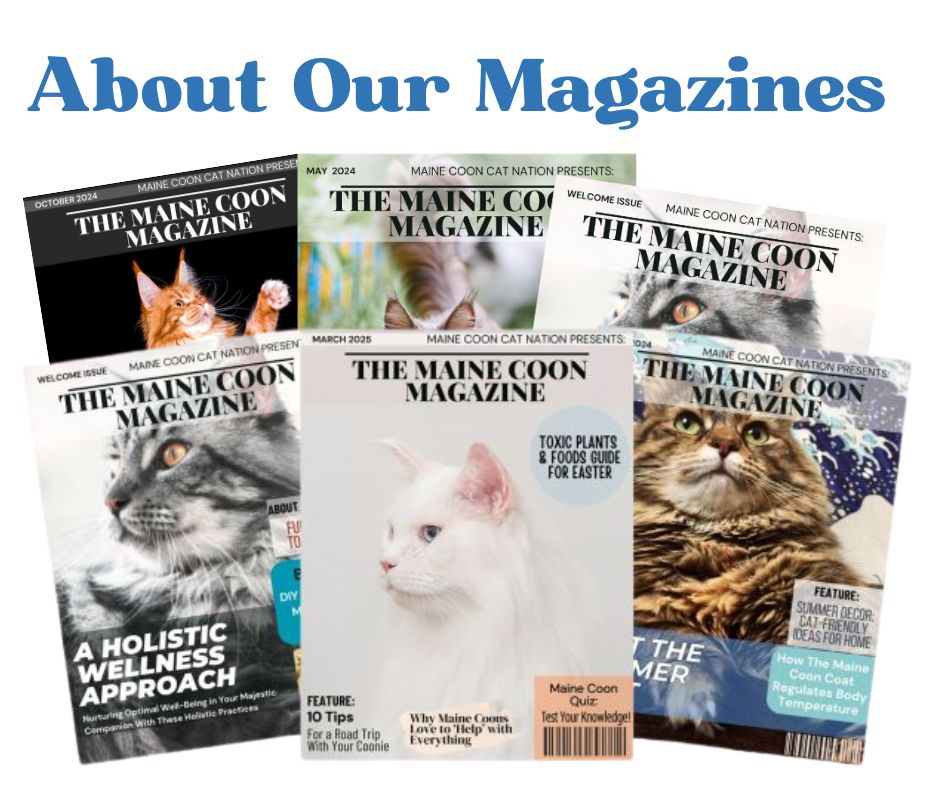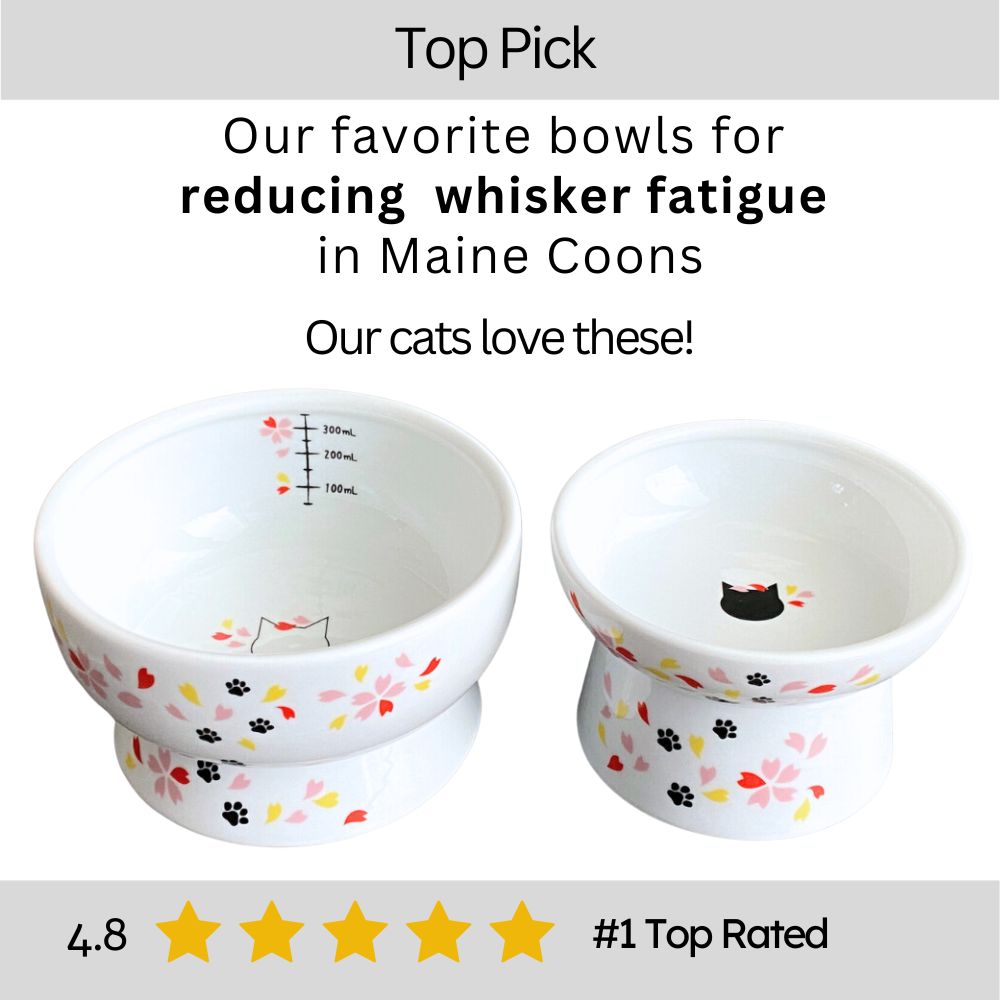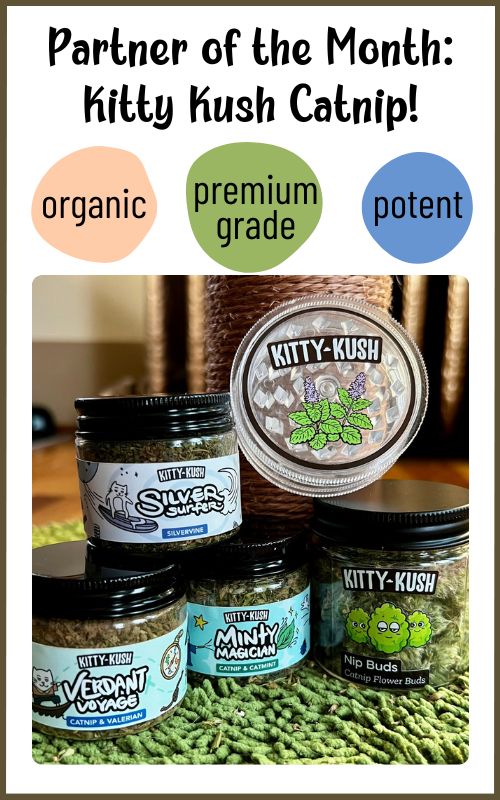- Home
- Maine Coon Food
Disclosure: this site is reader-supported. When you buy through links on our site, we may earn a small commission, at no extra cost to you.
Maine Coon Food Guide
Choosing The Best Cat Diet
The best Maine Coon food: What is the difference between a natural, organic, holistic, even raw and homemade cat diet? Let's dive in!
It can seem like a daunting task, finding the best nutrition for your cat. Every brand claims to be the healthiest, best Maine Coon food on the market.
Feline Diet and Nutrition: They Are What They Eat!
What does a Maine Coon need? What should he not consume? What exactly are fillers?
Well, as we all know, cats are carnivores. Actually, they are called obligate carnivores. Obligate is related to the word obligated - meaning, they have to eat meat.
At a minimum, meat should be the number one ingredient in your cats diet. There is so much to say about the ingredients that we have a full page on that: cat food ingredients.
Do you really know what's in your cat's dish? Finding the best diet starts with understanding ingredients. Some of these ingredients can be mysterious, from corn gluten meal to chicken meal.
This section gives an overview of what you need to know in order to choose the ideal Maine Coon food for your cat.
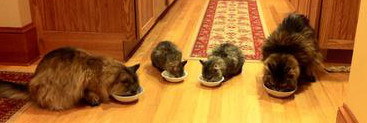 Marley, Arthur, Luca and Beppino from Maine
Marley, Arthur, Luca and Beppino from MaineWet vs. Dry Cat Food
Kibble has its proponents and those who are staunchly against it.
Dry cat food, or kibble, has the advantage of convenience. It is long-lasting, and can be left out without measuring for free feeding.
When feeding kibble, owners should take care to make sure there is always fresh water available. Since cats are designed to digest moist meat, they must drink extra water to compensate for the dry food.
Many cats just don't drink enough to compensate for the dry diet. So supplementing your cats diet with a wet (or canned) entree can help ensure they are getting enough moisture.
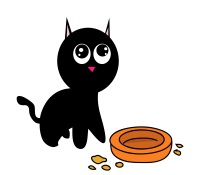
Also, it's nice to add a little flavor variety to their diet, and it can help them from becoming finicky. A high-quality wet diet is closer to a cats natural diet.
Another benefit to wet cat food is that it may provide any vitamins or minerals that dry kibble lacks.
Many high quality dry kibbles aim to provide a complete and balanced diet. Since they are constantly improving, it's safe to say they are not perfect yet!
To learn more, visit our page on the wet vs dry cat food choice.
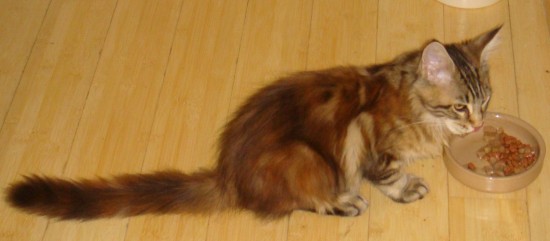 Minnie at mealtime
Minnie at mealtime6 Reasons I Like Free-Feeding
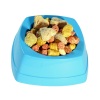
How much should you feed your cat? Is it enough? too much? Here are 6 reasons free-feeing works for us.
With their late-blooming status and voracious appetites, young Coonies may seem to be on the road to feline obesity.
This causes their pet parents to cautiously measure their Maine Coon food, and constantly ask themselves if it's enough, or perhaps too much. It's not always necessary!
Vegan Diet For Cats?!
This sounds totally counter-intuitive! But researchers University of Guelph in Ontario conducted a study on how a vegan diet affects the health of pet cats.
The survey took place from June 2018 to March 2019 with 1,325 cat owners in Canada and the U.S. Just over 18% feeding cats a plant-based diet. Owners filled out an online questionnaire.
This contradicts conventional wisdom which points to cats' requiring key nutrients from meat, and without them can suffer heart, liver, skin and eye health problems.
It's important to note that the survey, which was published in BMC Veterinary Research was based on the owners’ perceptions of their cats’ health.
Cat owners are notoriously bad at evaluating their own cats health, so caution is advised. Also, health problems can take time, even years to surface.
Researchers consider this an interesting beginning, with more objective studies needed. It's definitely not recommended, just something interesting. [1]
Diabetic Cat Nutrition
Wheat gluten should be avoided especially if your cat is diabetic. The carbs consumed turn to sugar upon digestion, just like in people.
The Maine Coon food for diabetic kitties is high in protein, and low in carbohydrates. You can prepare meat yourself, or buy high-quality wet food. (Regular dry kibble tends to have a high carbohydrate content.)
This can really help, and in some cases eliminate, their symptoms.
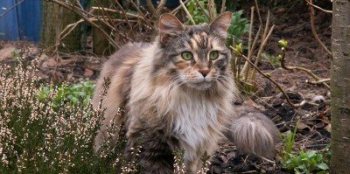
Best Maine Coon Food For Dental Health
Many have heard, sometimes from their veterinarian, that a diet of dry cat food helps protect against gingivitis. The action of chewing and crunching the dry kibbles helps to clean the teeth.
Studies have shown that feline's who have been fed a dry kibble diet, and especially those fed a dental-health specific kibble have developed significantly less tartar and gingivitis.
For many pet parents, a combination of dry and wet diet gives them the best of both worlds. For others, the solution is to brush their kitty's teeth.
Fans of a raw diet point out that in the wild, when a cat tears and chews raw meat, the grinding and scraping action keeps teeth clean and healthy.
Natural Cat Food
What does this really mean? There actually is a definition, according to The Association of American Feed Control Officials (AAFCO):
"A feed or ingredient derived solely from plant, animal or mined sources, either in its unprocessed state or having been subject to physical processing, heat processing, rendering, purification, extraction, hydrolysis, enzymolysis or fermentation, but not having been produced by or subject to a chemically synthetic process and not containing any additives or processing aids that are chemically synthetic except in amounts as might occur unavoidably in good manufacturing practices."
It's a mouthful. All the ingredients have to come from nature, and no man-made ingredients can be added, such as chemically synthetic additives.
So, this means that since meat by-products are natural, as are corn and wheat, these ingredients can be included.
Organic Cat Food
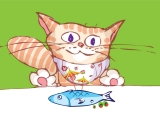
It's not the USDA, but the AAFCO that oversees the manufacture of pet food. There is currently no official definition of "organic" by the AAFCO.
So there isn't really an industry standard when it comes to organic pet nutrition. It may differ by company. Some products are actually marked as being "USDA certified organic".
So, these companies have taken it upon themselves to produce organic cat food that meets the USDA specifications to be organic.
In this case, USDA organic would mean that the fruit, vegetable and grain ingredients are clear of chemical fertilizers, pesticides and herbicides.
No synthetic preservatives, artificial color or flavor has been added. And, the livestock that was used was fed a natural diet and not given growth hormones or antibiotics.
Holistic Cat Food
This is another term not clearly defined by the AAFCO. But, there are guidelines that the companies who produce holisitic cat nutrition follow.
The term "holistic", with it's root word of "whole" has come to mean many things. In pet diets, it means that whenever possible, minimally processed whole-food ingredients are used.
So, this type of diet is made with ingredients containing the vitamins and minerals needed.
Also, the whole-body health of the animal is taken into consideration. Healthy skin and coat, hairball control, and weight management for example.
Where many brands of dry kibble will contain ingredients and additives we might not be able to pronounce, the list of ingredients on a bag of holistic cat food will read more like fresh items found at a supermarket or grocer.
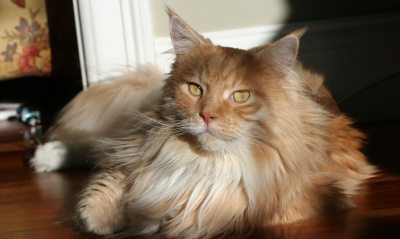
Homemade and/or Raw - The Best Maine Coon Food
The ultimate, the best Maine Coon food is a homemade or raw diet. Many pet owners make this commitment, and reap the benefits of having a pet who is absolutely in top condition.
There's no denying the fact that a diet of homemade, or raw cat food, prepared by an owner is the best Maine Coon food around.
It's also true that many folks simply aren't able to go that route. For many pet parents, these options are too expensive and/or too time-consuming. If so, buying a high-quality pet food is a great choice for a healthy pet!
Maine Coon Food Reviews:
Wellness Cat Food Review: Wellness, with its quality ingredients, is a staple in our house. Our kitties thrived on it for many years.
Switching to it even cleared up an ongoing cat-vomiting problem. This page has all you need to know about Wellness.
Royal Canin for Maine Coons: Royal Canin has a specific formula marketed for our magnificent breed. Here, we talk about it's ingredients, what makes it breed-specific, and whether it's worth it.
From Our Community:
There have been a few very good Maine Coon food, diet and nutrition questions asked and answered by our community.
These questions have been organized into some very informative FAQ's pages related to nutrition:
Multivitamins for Coonies: Here, a reader asks: "Which multivitamin would you suggest for this breed if diet is raw wet food?" Our community discusses raw diets and supplements here!
Orijen dry cat food: Our community members discuss their experiences with Orijen. Check out their opinions and reviews!
Best Diet for Maine Coons: Our readers discuss, "What is the best diet for Maine Coons?" We all want the best for our cats and usually, that comes down to knowing the ingredients.
Maine Coon Cat Diet And Nutrition: These Coonie parents discuss whether grain is ok, and they especially talk about how much to feed their cats and kittens.
Best Maine Coon Diet: Here, Edna asks, "what is the best cat diet for my 9 year old Maine Coon?" We go over brands, ingredients, carbohydrates, grains, proteins and come up with a plan.
Maine Coon Kitten Food Threads: These conversations are about meat by-products for a kitten, how much to feed kittens, and whether milk is ok.
Cat Diet Questions: These community members discuss overweight cats, transitioning to an adult formula, and choosing the best kibble. This is also where you can ask your question, too.
What is the best food for cancer prevention? There isn't really a cut and dry answer, but here we talk about it.
Ask a Question!
Do you have a question about Maine Coon Food, Diet or Nutrition? Fill out the form below to get an answer! Give us as much information as you can, so we can best understand your unique questions!
More Questions From Readers
Click below to see questions and answers from other visitors to this page...
Cat Not Eating as Much as Before 




1 Year Old Eating Less As Time Goes On
Hello,
I have a 14 month old male Maine coon who is 15.2 lbs, however he is not eating as much as he used to. …
Can Maine Coons Eat Normal Cat Food? Not rated yet
I’m getting a Maine Coon soon (so excited!) and I’m in the middle of planning everything I’ll need. One thing I’m wondering about is food - can Maine Coons …
Choosing the best Maine Coon food for your furry friend is the first step to providing a beloved pet with the longest, healthiest life possible. Not to mention fewer visits to the vet!
[1] Stevenson, J. (2021, March 14). Cats appear to be OK with vegan diets: Study. Torontosun. https://torontosun.com/news/cats-appear-to-be-ok-with-vegan-diets-study
Recent Articles
-
Will a Maine Coon Protect Its Owner From Danger or an Intruder?
Apr 09, 25 10:41 PM
Plenty of people are curious: Will a Maine Coon protect its owner if something happens? Let’s talk about what this means, and what kind of protector a Coonie is. -
9 Types of Maine Coon Cats and How to Tell Them Apart
Apr 09, 25 03:58 PM
When people say "types of Maine Coon cats," they're usually talking about color. But as Coonie lovers know, there’s a lot more to it than that! From wild-looking European lines to polydactyl paws and… -
10 Questions to Ask a Breeder Before You Commit
Apr 08, 25 03:51 PM
Here are some important conversation starters and questions to ask a breeder that can help you feel confident about where your future furbaby is coming from. This is a big decision - whether you're le…
